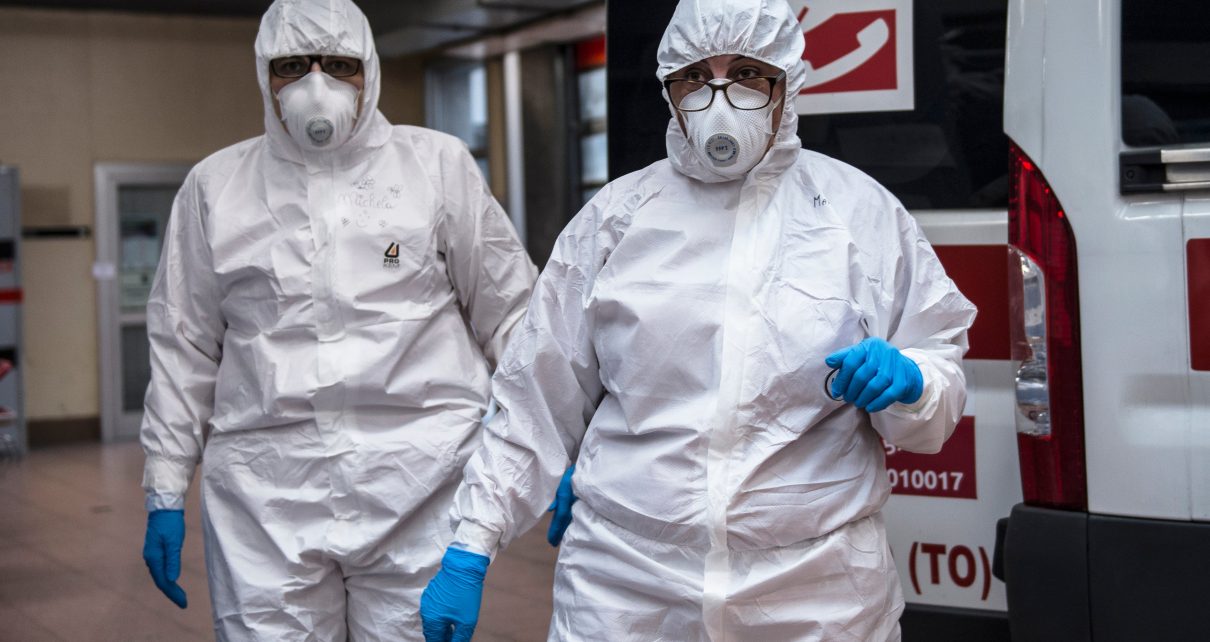After she arrived at Stevens Institute of Technology six years ago, Theresa MacPhail quickly became a friend and go-to source for advice on nasty viruses. I did a Q&A with Theresa on the 2014 Ebola outbreak, and I started getting flu shots because she told me I’d be an idiot not to. She is a medical anthropologist, with a Ph.D. from the University of California, Berkeley, who specializes in global responses to pandemics. As part of her thesis research, she spent a year embedded with the Centers for Disease Control, and she was in Hong Kong in 2009 when the H1N1 influenza outbreak occurred. She wrote a book about the global response to that pandemic. Early in March, Theresa became ill, probably because she’d been infected by the new coronavirus, Sars-Cov-2, which causes the disease called COVID-19. She can’t be sure, because she couldn’t get tested. She’s still struggling with symptoms. She’s also teaching, taking calls from VICE and other media and writing a book on allergies for Random House. And yet she still took the time to answer my questions about our current crisis. – John Horgan
Horgan: When did you first hear about COVID-19, and what was your reaction?
MacPhail: I saw it on Pro-Med in early January. [Just in case you don’t know what that is, this is description from their website: The Program for Monitoring Emerging Diseases (ProMED) is a program of the International Society for Infectious Diseases (ISID). ProMED was launched in 1994 as an Internet service to identify unusual health events related to emerging and re-emerging infectious diseases and toxins affecting humans, animals and plants. ProMED is the largest publicly-available system conducting global reporting of infectious diseases outbreaks.]
I remember thinking that it was interesting, but the initial data coming out of China didn’t worry me. I was confident that the Chinese CDC and the Chinese government would handle it, since they have a strong system for dealing with outbreaks due to their past experiences with SARS (2003) and occasional outbreaks of avian influenza. The initial case information also made this look similar to a very bad influenza strain – obviously much worse than normal, seasonal flu, but nothing as bad as a strain of avian influenza like H5N1 would be. I didn’t think much about it, other than keeping an eye on it.
Horgan: How has your thinking about the pandemic evolved since then?
MacPhail: Well, it’s changed quite a bit. Initially, I had confidence that the US CDC would do what they always do – handle the situation and provide local and regional public health departments with guidance and support. Those of us not currently working in public health didn’t know what everyone working inside those circles did: we didn’t have viable tests. The initial failure of the CDC’s test kits – the assays they had sent to labs across the nation – wasn’t readily available knowledge at first. I don’t think any of us – and by “us” I mean the general public – really understood what was going on behind the scenes during the early weeks of January, after China had released the genetic information of the new Sars-Cov-2 virus. The scramble to get testing up and running wasn’t immediately obvious to anyone.
Because I had such a good perspective on our national response to the 2009 H1N1 pandemic, and knew how well we had responded then, I was overconfident that our response to this pandemic would be similar. I felt as though we had “drilled” for this event and that we would be ready. I could not have been more wrong. It’s clear to me NOW that we weren’t ready and that we didn’t have any contingency plans for when the CDC’s testing kits failed. The usual protocols that involve the CDC and the FDA giving approval to develop and use tests were not lifted, which seems to have created an odd – and disastrous – delay in getting testing capabilities up and running throughout the country.
I should say this, however, in some defense of what happened. In 2009, what we were dealing with was a very different virus. We had what are called “point of care” diagnostic tests available very early on that required no specialized skills or equipment to run. Point of care simply means that the tests are available at the site of care; they don’t have to be shipped to a separate laboratory to be performed. Now, with Sars-Cov-2, it’s a very different story. We don’t have point of care testing available. These tests require special equipment and special skills and need to be performed in a laboratory setting. Or its equivalent. And that complicated things. I still think that we have done a terrible job in relationship to testing, but there were reasons for this.
Horgan: You’ve been ill recently. First, are you feeling better? Second, has your personal experience, and especially your attempt to get tested for COVID-19, shaped your scholarly view of what’s happening?
MacPhail: Yes, my thinking has changed a great deal because of my own experience. I came down with a viral infection on March 1. It started with a sore throat and fatigue. By the 5th day of the illness, I had a fever of 102.5 and for 5 days, that fever never dipped below 100 degrees, despite taking copious amounts of fever reducer. I ended up in the ER on March 9 with a fever, dry cough, and tightness in the chest. They gave me a flu test – which came back negative – and a strep test – also negative. I had a chest x-ray that looked clear, so I was put on a nebulizer for 30 minutes, given a steroid short-burst to help with my breathing, as well as an inhaler. I was sent home to quarantine. Things progressed and I got more and more congested – both nasal and chest congestion. I went back to urgent care and no tests for Sars-Cov-2 were available. This was on March 15. The doctor on call at urgent care said she would have tested me if she could, but she had zero kits available. Because I am “low-risk”, my regular physician, who does have limited testing available, could not waste one of the test kits on me. I still haven’t been tested. It’s March 26 and I am slowly recovering, but still congested.
I started to panic about our response after my ER trip on March 9. At that point, I knew we were botching this response. The most important thing is testing. You can’t combat or design effective public health responses for what you can’t see. Where are the hotspots? How big is the problem? It was clear to me that we didn’t – and couldn’t – know. Thank god for modeling and biostatisticians. Without them, we’d have almost nothing to go on. We don’t know if the numbers we’re seeing are accurate, but they’re better than nothing. Still, without testing, we’re stuck socially isolating. Only massive testing will make it possible to return to “life as normal.” And I don’t have hopes of that anytime soon. I truly don’t understand it. Other countries have done so much better than us on this front. Here in NYC, I feel like it’s too late. We’ll have to do massive testing to prevent the second wave.
Horgan: Stanford epidemiologist John Ioannidis has suggested that the U.S. might be overreacting to the virus, given how little data we have. Comment?
MacPhail: He’s not wrong about the lack of data, but he’s wrong about overreacting. I think if you look at the data we do have, from several countries now, it’s clear that this situation is very bad and will quickly overwhelm our hospital system. To be honest, I was closer to his standpoint in early January. But we didn’t have a clear picture. Now we do. No one should be pooh-poohing this virus at this stage of the game.
Horgan: What worries you most about the pandemic and our response to it now?
MacPhail: I worry about the lack of a coherent national response. I worry that states are doing what they want, and not necessarily doing what they should. Usually, the CDC would be providing guidance and orchestrating a national response. That’s not happening.
I also worry that we’re not prepared – in any way – for an extended response. This is going to be months, not weeks. There will likely be a second wave. A third wave. We need a vaccine, but we need a coherent plan until we get one. We also don’t know what a second wave would look like. Again, that’s why we need testing on a massive scale. So that we can get in the way of the second wave.
Horgan: What heartens you, if anything?
MacPhail: Well, I know how dedicated most healthcare workers are. I know that they’re out there, doing everything they can. And I know that scientists around the globe are doing their best. They’re in their labs, nearly killing themselves to make assays, to do testing, to study this virus and come up with a solution.
I also am heartened by the local responses I’ve seen. A bunch of young New Yorkers volunteering to buy groceries for the elderly and immunocompromised, adhering to best practices to prevent contaminating the deliveries. Just people stepping into the gap, doing what they can.
Horgan: If you were the Pandemic Czar, what would you advise President Trump to do right now?
MacPhail: No offense to your readers, but I’d tell him to shut up for a minute. Let the CDC lead. Let Anthony Fauci lead. Most of the talking and planning and decision-making should be left up to experts. He should give them free rein and support them. He should be echoing their advice and letting Americans know that our health is of vital importance. After all, if we’re not healthy, there is no economy.
Going forward, I think the CDC should be insulated from political influence of any kind. I don’t think we’ve done a good enough job of separating out science from state. Places like the NIH and the CDC should largely be autonomous bodies with federal oversight, run by experts in their respective fields who are elected by their peers, not politically appointed. That’s just my two cents.
Horgan: What would you recommend to protect us against future pandemics?
MacPhail: Three words: Fund public health.
Fund public health programs the way we fund national defense programs. Because, well, public health is national defense…against deadly pathogens.
We know what to do. We just don’t do it. We react to things like SARS or HIV and then, once they disappear or become more manageable, we go back to acting like we’re invulnerable. In between pandemics, we pretend there’s no problem. But people in public health have been warning us something like this was going to happen. They’ve been warning us for decades.
Horgan: Has any non-authoritarian country handled the coronavirus especially well?
MacPhail: Germany seems to be doing okay. And, of course, South Korea.
During the 2009 pandemic, I often heard people in public health joking – but then also not joking – that they wished they had China’s ability to just force citizens to do the right thing. China doesn’t have to worry about whether or not people line up to get vaccinated; they can just enforce vaccination. I don’t think any of the people who made these jokes actually want to live under an authoritarian regime, but they were envious of China’s ability to mobilize and get things done.
Pandemics tend to make everyone a little more authoritarian, at least temporarily. It’s a necessary evil. People aren’t always going to stay home voluntarily, or close their shop willingly. The trick is balancing out those exceptional powers and making sure that they don’t become the rule.
Horgan: Experts have offered a broad range of estimates about how long we’re going to have to practice social distancing to defeat this virus. Care to offer a guess?
After being so wrong about my predictions in January and February, I don’t even want to hazard a guess. I’d say 2-3 months at a minimum. It all depends, really, on how fast we can get massive-scale testing up and running. That way we can target isolation and quarantining practices.
Horgan: We’re all saturated with news about the coronavirus now. Is there anything that it’s especially important for us to know?
MacPhail: That there’s still a lot of uncertainty. There’s a lot more that we know, but we still don’t know a lot about this virus. We’re still learning.
Horgan: I wrote a column laying out positive possible outcomes of this pandemic. Can you envision any upside?
MacPhail: Yes, I can. I think we’re all going to have to rethink our relationship to each other. This has made clear that there’s a limit to American individualism. We live and survive in interconnected communities. We ran out of toilet paper in one minute. We can’t survive alone.
Also, I think we’ll need to reexamine our work culture. We may get paid sick leave for everyone out of this. And the bravado of working through an illness? That should change. We need to stay home when we’re sick and wear masks in public if we can’t. Again, it’s a shift from thinking about ourselves all the time, to thinking about our communities and neighbors.
And, finally, if these events aren’t the best damn argument for universal healthcare that I’ve ever seen, then I don’t know what else is.
Further Reading:
Ebola “Fear Mongering” Critiqued by Medical Anthropologist
The Coronavirus and Right-Wing Postmodernism
See also my free, online book Mind-Body Problems: Science, Subjectivity & Who We Really Are.
Read more about the coronavirus outbreak here.



